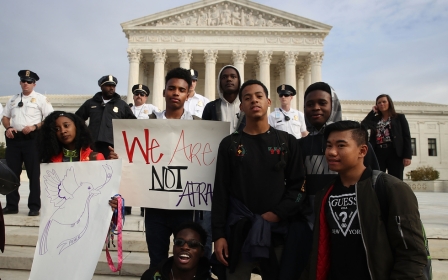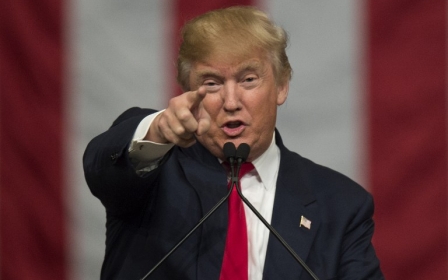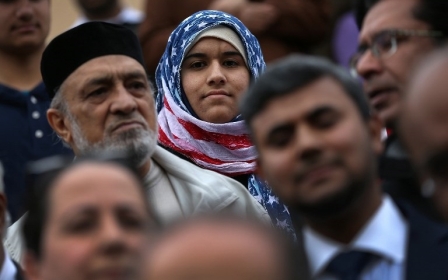With Trump USA, big troubles ahead for ‘Brand Israel’

The warm congratulations extended by Israeli politicians to Donald Trump after his election victory was unsurprising. Benjamin Netanyahu’s government is a coalition of right-to-far-right parties, including ministers with a penchant for authoritarian, nationalist legislation, and anti-Palestinian, Islamophobic rhetoric.
Even Israel’s largest opposition group – the Labor party-dominated Zionist Camp – represents a kind of politics that similarly resonates with Trump-ism; Isaac Herzog, remember, is a fervent supporter of racial separation and walls, and a passionate opponent of having a non-Jew for prime minister.
This, however, is not the image Israel likes to present to the world – and it’s the polar opposite of the ‘brand Israel’ promoted in Britain and North America by Israeli diplomats and pro-Israel lobby groups. This imaginary ‘Israel’ is a land of multicultural cuisine and tolerance, a vibrant democracy desperate to make peace with stubborn, recalcitrant Palestinians.
This project to ensure Israel is not associated with decades-long military occupation, apartheid, and military brutality has always been a tall order. The election of Trump could signal its final demise.
Trump's stances akin to mainstream Israel
First, because the glee with which Trump’s victory was greeted by Israeli ministers will not have gone unnoticed – nor the reasons for their contentment.
Education minister Naftali Bennett declared that “the era of a Palestinian state is over”. A settlement construction spree is expected. Justice minister Ayelet Shaked expressed hope that Trump will move the US embassy to Jerusalem.
Responding to the US election result, Westminster lobby group Labour Friends of Israel struggled to contain its gloom: its members should be “disheartened” but “not despair”, it said.
They know as well as anyone else that the tough task of portraying an Israeli government dominated by the pro-settler, far-right as a "partner for peace" is about to get a whole lot tougher.
Second, many will make the comparison – if they haven’t already done so – between Trump’s brand of racist, ethno-nationalist, security-state politics and what has long been the mainstream in Israel.
We must show liberals that what disgusts them about Trump is what has characterised and shaped Israeli political culture and government policies for decades – not only in recent years.
Deal with the devil
Third, Trump’s victory is likely to widen existing fractures among supporters of Israel, especially in the American Jewish community, and see a growth in those drawn into Palestine solidarity activism.
The divisions have emerged immediately, with the appointment by Trump of white supremacist, "alt-right" media figure Steve Bannon as chief White House adviser.
As Politico reported, “key members of Washington’s pro-Israel community, along with Israeli government officials, are avoiding criticism of the controversial Donald Trump adviser Steve Bannon,” on the basis that Trump is expected to be “a strong defender of Israel”.
Chronicling the context to all of this in 972mag, Edo Konrad described a “tradeoff” by “the right-wing Jewish establishment in America”: “incur anti-Semitic politicians and attacks in exchange for a president who will come down on Muslims, back reactionary policies on immigrants, and blindly support Israel”.
Konrad noted that “the same logic…undergirds the thinking of Israeli politicians who back far-right European politicians such as Marine Le Pen, Geert Wilder, and Heinz-Christian Strache: we will politely ignore their Nazi pasts, pesky anti-Semitic cartoons, and outright incitement — as long as they continue to back the Jewish state. This is what a deal with the devil looks like”.
Toxic nexus
A Trump administration is going to put an unprecedented spotlight on that toxic nexus of white supremacists and Islamophobes who are also fervent supporters of Israel.
As an article in The Forward put it: “Just as the US starts mimicking Israel, most Jews have become deeply uncomfortable.”
Meanwhile, many of those who have repeatedly equated anti-Zionism with anti-Semitism, or similarly smeared solidarity with the Palestinians in the form of boycotts, are silent now that Trump has brought real anti-Semitism and white supremacism into the highest corridors of power.
The contrast is as illuminating as it is damning. Alan Dershowitz, for example, has defended Bannon in unintentionally hilarious fashion, complaining that it is not legitimate to call someone an anti-Semite just because you disagree with their policies.
Desmond Tutu and Jimmy Carter might like to take that up with him.
Public hypocrisy
None of this is new. Back in 2009, the editor of the Jewish Chronicle, Stephen Pollard, defended right-wing Polish politician Michal Kaminski from claims of anti-Semitism on the basis of his support for Israel.
This, of course, was the same man who declared in 2000, “we want Poland for the Poles”, and who opposed a public apology by the Polish president for a 1941 massacre of Jews.
As one piece put it this week: “According to this logic, as long as you support certain policies of the current Israeli government, it’s okay to pal around with people who hate Jews”.
But a Jew who opposes Israeli government policies? “That will earn you the title of anti-Semite.”
This very public hypocrisy, combined with the growing influence of those who “hate Jews but love the Jewish state”, and an Israeli government that was already accelerating policies of colonisation and displacement before Trump’s victory, spells big trouble ahead for ‘brand Israel’.
- Ben White is the author of Israeli Apartheid: A Beginner’s Guide and Palestinians in Israel: Segregation, Discrimination and Democracy. He is a writer for Middle East Monitor, and his articles have been published by Al Jazeera, al-Araby, Huffington Post, The Electronic Intifada, The Guardian’s Comment is free, and more.
The views expressed in this article belong to the author and do not necessarily reflect the editorial policy of Middle East Eye.
Photo: People walk past signs bearing the name of US President-elect Republican Donald Trump in Tel Aviv, Israel, 14 November, 2016
New MEE newsletter: Jerusalem Dispatch
Sign up to get the latest insights and analysis on Israel-Palestine, alongside Turkey Unpacked and other MEE newsletters
Middle East Eye delivers independent and unrivalled coverage and analysis of the Middle East, North Africa and beyond. To learn more about republishing this content and the associated fees, please fill out this form. More about MEE can be found here.





